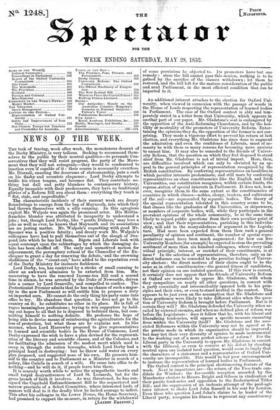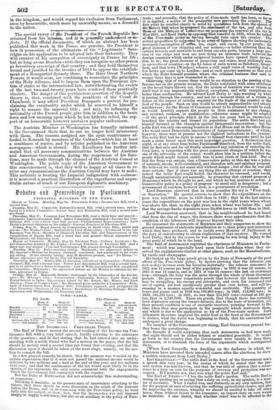An additional interest attaches to the election for Oxford Uni-
vermq, when viewed in connexion with the passage of words in the House of Lords respecting the representation of learned bodies in Parliament. The case of the Oxford contest is ably and tem- perately stated in a letter from that University, which appears in another part of our paper. Mr. Gladstone's seat is endangered by the opposition of the Anti-Reforming Churchmen, and by the hos- tility or. neutrality of the promoters of University Reform. 'Enter- taining the opinions they do, the opposition of the former is not sur- prising. They made a vigorous effort to prevent his return at last election, and everything Mr. Gladstone has since done to augment the admiration and even the confidence of Liberals, must of ne- cessity be with them so many, reasons for becoming more anxious to unseat him. It may also be conceded to the friends of Univer- sity Reform, that the question on which they feel disposed to stand aloof from Mr: Gladstone is not of trivial import. Here, then, are difficulties involved which can only be obviated by an ap- peal to the general principles of representation recognized by the British constitution. By conferring representatives on localities in which peculiar interests predominate, and still more by conferring
• representatives on class constituencies like the English and Irish Universities, our constitution recognizes, within-certain:lb-nits; the represe.atation of special interests in Parliament. It does not, how- ever, recognize them to the same extent as the constituencies of countries in which classes—nobles, clergy, traders, and cultivators of the _poil-are represented by, separate bodies. The theory of the special representation tolerated in this country seems to be, that classes like the graduates of the Universities, or shipowners, or members of corporate bodies, will, while they participate in the prevalent opinions 'of the whole community, be at the same time • likely to regard public questions from their own peculiar point a view ; and that their representatives, partaking in this individu- ality, will add to the manysidedness of argument in the Legisla- ture. Had more been expected from them than such a general peculiarity of opinion and sentiment, the number of special repro- _ sentatives . must have been much augmented : for how can five . UniversityMembers (for example) be expected to stem the prevailing sentiment' of more than six hundred colleagues, where every indi- vidual principle; interest, or 'crotchet of their constituents, is at issue P In'the selection of representatives, therefore, only an in- direct influence can be conceded to the peculiar feelings of Univer- sity electors : the direct motives of their choice ought to be the • same as in other constituencies—the general fitness of candidates, not their opinion on one isolated question. If this view is correct, it certainly dOes not 'appear that the friends of University Reform at Oxford are- warranted to oppose Mr. Gladstone, with whom they sympathize on nearly all other questions, in concert with a party essentially and irreconcikably opposed both to his prii- ciples and their own, or even to stand neutral in the contest. This appears to be just even on-the assumption that Mr. Gladstone and these gentlemen 'were likely to take different aides when the ques- tion Of U:niversity Reform is brought before Parliament. But is it certain they will ? Mr. Gladstone defended the University when as- sailed by-external enemies, and when no defined plan of reform was before the Legislature : does it follow that he, with his liberal and liberalizing tendencies, will oppose a specific measure emanating from within- the University itself? Mr. Gladstone and the asso- ciated Reformers within the University may not be agreed as to the precise mode in which its organization should be improved; but marnot their very diversity of opinion be made instrumental to the Working out of a more perfect scheme of reform ?. .1 or the Liberal party, in the University to oppose Mr.. Gladstone concert with the Illiberal, or even to connive at his defeat by standing -neutral upon one isolated local question, would seem to imply that the characters of a statesman and a representative of Oxford Uni- versity are incompatible. This would be but poor encouragement to increase the representation of learned bodies in Parliament. The Oxford contest is the principal electioneering feature of the week. Next in: importance are—the return of the Free-trade can- didate for Windsor ; the favourable reception accorded by the Manchester electors to Messrs. Bright and Gibson in vindication of their pacific tendencies and opposition to the Ecclesiastical Titles Bill; and the suppression of an inchoate attempt of the paid-ay. tater interest to shake Lord John Russell in his' seat for _London. Even those who question Lord John's claims to be leader of the 'Liberal -party, recognize his fitness to represent any constituency
in the kingdom, and would regard his exclusion from Parliament, even by honourable, much more by unworthy means, as a discredit to the nation.



























